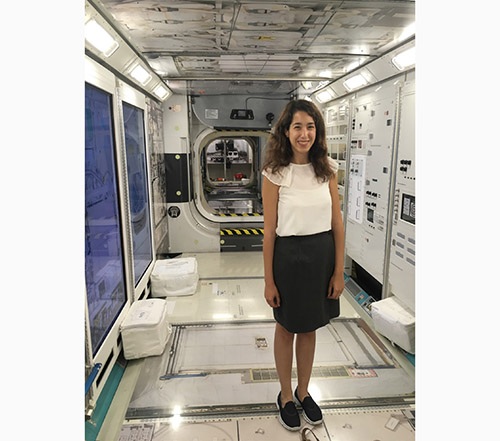
(Courtesy of AFBIU) On an official mission from Israel, Noa Yechezkel-Lubin, a graduate student in artificial intelligence in Bar-Ilan University’s Computer Science Department and a software developer at Amazon, has her sights on space after becoming the first Israeli to work at NASA.
Yechezkel-Lubin arrived earlier this month at NASA as part of the Israel Space Agency’s program at the Ministry of Science. As one of five young researchers selected by the Israeli Space Agency through the Asaf Ramon Scholarship Program, she will be working with leading researchers on future space projects and analyzing information from NASA’s modern telescopes.
The Asaf Ramon Scholarship Program is awarded through the Ministry of Science by Ofir Akunis, the Minister of Science, and includes a stipend of nearly $20,000 (NIS 70,000) for a three-month stay at NASA’s prestigious Ames Research Center in California.
Yechezkel-Lubin will participate in a study to find planets outside the solar system which are similar in size to Earth, using information from telescopes such as TESS, which was launched into space in April. She will also be developing algorithms based on the advanced methods of automating the classification of information.
“This is the first time that the combination of artificial intelligence and space came together in my mind, which will advance my ability to analyze a lot of information and the ability to draw conclusions from it,” said Yechezkel-Lubin.
As a child, Yechezkel-Lubin often traveled with her family and spent years living in Belgium and the U.S. In fact, she resided in Tenafly from 2003-2005. In each country in which she lived, she continued to work and excel in physics and mathematics.
“These studies provided me with an anchor when I came to a new place, where the language and culture changed completely, but science and numbers remained the same,” she explained.
After service in the IDF, she worked on the satellite control team at Israel Aerospace Industries, and from there studied electrical engineering at the Technion and worked at Elbit. Yechezkel-Lubin’s goal is to establish a start-up that will combine artificial intelligence and space.
In addition to her work, Yechezkel-Lubin looks to promote the field of science among women, and in recognition she has won scholarships for “excellence and social involvement” from Google, Intel and Apple.
“In one of the places I worked, we were two female engineers in a team of more than 40 engineers. This doesn’t make sense,” she explained. “Women are an integral part of technological teams, and these numbers show that we have much more work to do towards gender equality.”
Yechezkel-Lubin’s goal is to encourage women to enter scientific fields by integrating them into the “Marching to the Moon” initiative, which is an international project whose goal is to reach the total number of steps required to reach the moon.
“The average distance between the earth and the moon is 384,403 kilometers, a distance that would require the average person to take 478 million steps. Assuming that the average person walks at a rate of 4.8 kilometers per hour, it would take nine years to reach the moon. With our work at NASA in conjunction with Israel’s Ministry of Science, we can be part of light years of scientific innovation and exploration. This could bring us so much closer to the rest of the universe,” Yechezkel- Lubin concluded.













